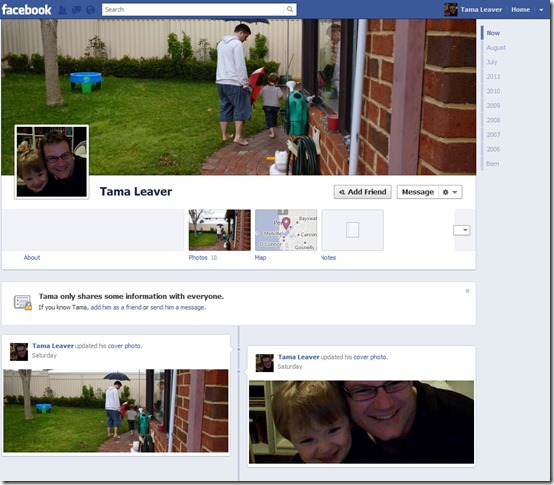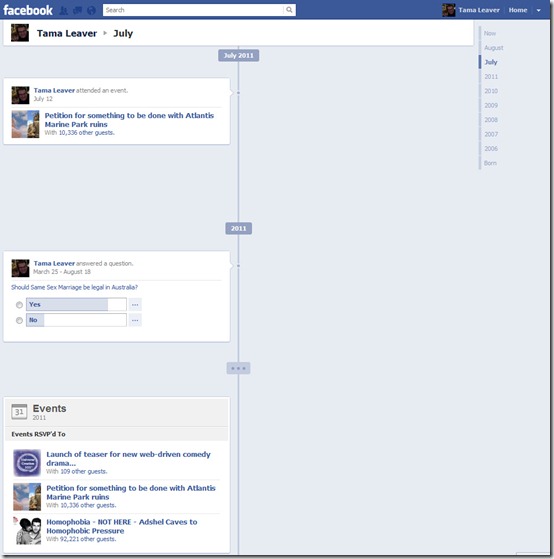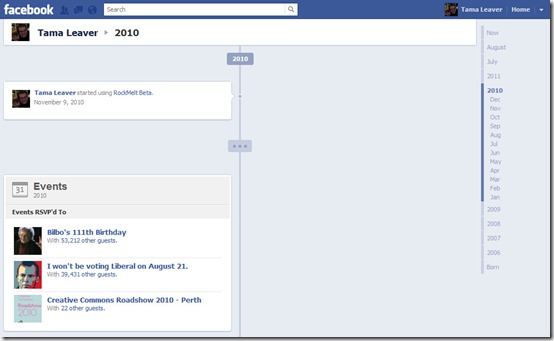Everyone’s Facebook profile will disappear in 6 October 2011, December 2011 replaced with a Timeline. Here are my thoughts and concerns about that Timeline, and some suggestions about managing your Timeline when it arrives …
I’ve been testing out Facebook’s new Timeline which will shortly replace profiles for all 800 million Facebook users. I have some concerns which I’ll outline in a minute, but I have to give credit where credit is due: Timeline looks amazing. I think this is the first time Facebook has stopped looking like a direct descendant of the profiles found on online dating websites! The new cover image, which is separate from your avatar or profile picture, stretches across the entire screen and is much more richly visual experience, combined with far better navigation tools for exploring the entirety of someone’s Facebook history, not just their current statuses and photos. Here’s what the top of my Timeline looks like:
The tools which allow you to emphasise certain events on your timeline let individuals build an engaging and carefully curated story of themselves. And in a move which deliberately situates Facebook as telling the story of your life, Timeline actively encourages users to add in missing details. When I look at the notification of my 2000 university graduation, Timeline suggests I add to the story and post a picture, enriching the tale visually. If I add a picture, then the event ‘looks’ more interesting and is more engaging than a bit of text in an ‘Info’ box. However, in moving from being primarily about current communication to adding the archival/historical emphasis, a number of privacy-related issues arise.
My Timeline image above is missing a lot of detail since it’s the view that the public can see – ie someone who I’m not connecting to at all – and my privacy settings are high (almost everything is ‘Friends Only’; incidentally, once your Timeline is visible you can use the right-hand setting indicator – the one that looks like a wheel – and select ‘View as …’ to check how your Timeline will look to anyone else, including the public view). It’s notable, then, that the cover photo — the big one, at the top of your Timeline, which isn’t your profile photo — joins your profile photo as an image that you can’t make private; if you can be found on Facebook, it’s there. (I presume this might disappear if you prevented your profile being found in searches, but I can’t say that definitively.) Profile pictures have been unavoidably public for a while, so we just need to remember this about cover photos, too.
If you scroll down my Timeline (which, as I said, is now absurdly easy with the right hand date-based navigation tools) this is what you can see for 2011 and 2010 (there’s not much there, but take a look at what is visible):
On some abstract level, I was aware that when I ‘voted’ or clicked ‘Attending’ I was committing to something that was visible beyond my immediate ‘friend’ network (notable for me since, due to my privacy settings, not much else is). However, most of these actions or events had, from my perspective, long since ‘disappeared’ to the extent that, in order to find them, someone would have to click to ‘load more’ on my Facebook profile page 20 times or more to see anything. Timeline changes that. Now my voting and the public events I attended are very prominent since that’s pretty much the only thing public. And while these were largely very quick responses, these little bits of information suddenly ‘say’ a great deal about me; indeed, for the public, these are the main bits of the story Facebook tells about me.
Now, some of the things I’ve said I’ve attended are pretty trivial, but some are political (it’s very clear what my political views are) and others are on the boundary of personal and political. When I voted ‘Yes’ to ‘Should Same Sex Marriage Be Legal In Australia’ I was stating something publicly, but I’d never considered that my response would be so prominent on Facebook (it wasn’t on my profile page very long, for example). Now, for me, this isn’t a big issue; I’ve got sufficient workplace security that I can’t imagine these views would jeopardise my employment, and I stand by my politics proudly. I suspect, though, this won’t be the case for everyone. I can think of numerous scenarios where this information might be misused by other people and I strongly recommend folks take a look at their Timeline view from the public perspective as soon as it’s available to them.
From what I can see, it is possible to remove certain items from Timeline, or at least reduce their prominence, but you have to do it from your view (not the public view I used to generate the above images) so if you’re a prolific Facebook user, it’ll take a while to find these items and reduce their visibility.
Now, I’m not suggesting Facebook ‘made public’ something that was private. This information may have felt private, but that was based on use, not on a technical sense of security. Indeed, danah boyd expressed this problem in her paper ‘Facebook’s Privacy Trainwreck: Exposure, Invasion, and Social Convergence’ explaining:
The tech world has a tendency to view the concept of ‘private’ as a single bit that is either 0 or 1. Data are either exposed or not. When companies make a decision to make data visible in a more ‘efficient’ manner, it is often startling, prompting users to speak of a disruption of ‘privacy’.
Technically, the information above was always public, but my experience of it meant it felt largely private. My example is extremely banal, but for other people, the sudden prominence of certain information may make it feel a lot more public than they ever intended. While I acknowledge Facebook has started to provide more robust privacy tools, I’ve seen nothing in the hype around Timeline to warn folks about the way their Timeline will tell a different story about them (and a different story to different people – your Friends will see one ‘you’, but the public may see a quite different one). If Facebook is going to be an ongoing repository, the always-being-edited ‘This Is Your Life’, then Facebook and those of us teaching about these tools need to ensure folks have a much better understanding about Timeline and similar changes. When your life story is a series of entries in a database, then the line between public and private is a single setting. However, that database, as we can see, can always be sorted, ordered and presented in very different ways.





Facebook’s New Timeline & Perceptions of Privacy http://t.co/JuI3Eo0P via @tamaleaver
RT @tamaleaver: Clearly my 'Facebook’s New #Timeline & Perceptions of Privacy' http://t.co/g0Bkemrv hit a nerve somewhere #FB #tech
A useful piece on the upcoming shift to Facebook timeline and what it might mean for your privacy: http://t.co/rrUWSgBi from @tamaleaver
Facebook’s Timeline & Privacy explained http://t.co/ZPim1dR6 via @tamaleaver
Well worth a read! Post by @tamaleaver on 'Facebook’s New Timeline & Perceptions of Privacy' http://t.co/dBwVdNRq
Great post Tama.
I think it’s fair to say that everything we do is rather public anyway. The architecture has changed, so not only is it public to some extent, information you’ve listed about yourself is going to be easier accessible and harder to control. It’s like a game of hide and seek, where you’ve got your little hiding place. It’s not exactly private, but it takes effort for someone to find you. Now you’re out in an open field with nothing more than a twig to hide behind!
I can imagine everyone doing a bit of back peddling, deletions and removal of posts – even the most trivial things may be misconstrued.
some useful preliminary thinking on facebook's new 'timeline' function by @tamaleaver – http://t.co/7h0zQM8f
Now that it's open for everyone http://t.co/lA86ybtr pls read Facebook’s New Timeline & Perceptions of Privacy http://t.co/BXgNOqRB
Now that it's open for everyone http://t.co/lA86ybtr pls read Facebook’s New Timeline & Perceptions of Privacy http://t.co/BXgNOqRB
Worth a read: Tama Leaver's blog post on "Facebook’s New Timeline & Perceptions of Privacy" http://t.co/dBwVdNRq
http://www.tamaleaver.net/2011/10/02/facebooks-new-timeline-perceptions-of-privacy/
“I think it’s fair to say that everything we do is rather public anyway”
Not at all fair, Paula. I’d say 80% of what I do outside of work is private and of my own choosing. And not for any secrecy on my, simply because that’s what I choose to do and we’ve built up over a long time a series of norms and behaviours to make that so. Treating it as a game or that’s technology! or what have you got to hide (and the latter two aren’t your arguments) is a way of trivialising the way these controls are taken away and making ourselves to blame.
To give an example, a while back I was talking to an Australian teacher in rural Japan and she was complaining how everything she bought at the supermarket became public discussion in the town she was in. In one sense she was in a public space and chose to shop at that supermarket so it was her problem. But in a proper sense what had been transgressed was her reasonable expectations of privacy and her actions in a commercial sphere. She had every right to be pissed off and I think we’ve got every right to be pissed off on the net.
Thanks for the great post, Tama.
@amuir_netecol less a timeline surprise and more an ongoing concern: http://t.co/BXgNOqRB
I also made a pretty easy to follow Facebook Timeline guide with an added focus on privacy: Facebook Timeline Complete Guide
Hope you like it 🙂